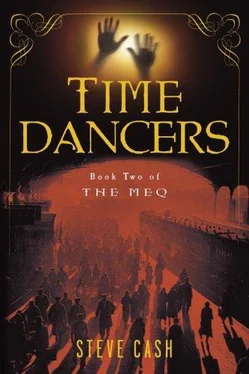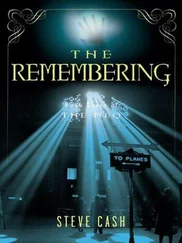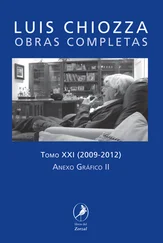Steve Cash - Time Dancers
Здесь есть возможность читать онлайн «Steve Cash - Time Dancers» весь текст электронной книги совершенно бесплатно (целиком полную версию без сокращений). В некоторых случаях можно слушать аудио, скачать через торрент в формате fb2 и присутствует краткое содержание. Год выпуска: 2006, ISBN: 2006, Издательство: Del Rey, Жанр: Фэнтези, Детективная фантастика, ya, на английском языке. Описание произведения, (предисловие) а так же отзывы посетителей доступны на портале библиотеки ЛибКат.
- Название:Time Dancers
- Автор:
- Издательство:Del Rey
- Жанр:
- Год:2006
- ISBN:0345470931
- Рейтинг книги:4 / 5. Голосов: 1
-
Избранное:Добавить в избранное
- Отзывы:
-
Ваша оценка:
- 80
- 1
- 2
- 3
- 4
- 5
Time Dancers: краткое содержание, описание и аннотация
Предлагаем к чтению аннотацию, описание, краткое содержание или предисловие (зависит от того, что написал сам автор книги «Time Dancers»). Если вы не нашли необходимую информацию о книге — напишите в комментариях, мы постараемся отыскать её.
Time Dancers — читать онлайн бесплатно полную книгу (весь текст) целиком
Ниже представлен текст книги, разбитый по страницам. Система сохранения места последней прочитанной страницы, позволяет с удобством читать онлайн бесплатно книгу «Time Dancers», без необходимости каждый раз заново искать на чём Вы остановились. Поставьте закладку, и сможете в любой момент перейти на страницу, на которой закончили чтение.
Интервал:
Закладка:
“I…I am sorry, Pello,” I said.
He now wore a blue beret instead of red. He was leaning on his cane and shifted his weight slightly, then removed his beret. His hair had turned completely gray in the six months since I had seen him last. “Thank you, señor,” he said softly. “My father was an old man and lived a long, good life.” I could still see the soldier in the back of Pello’s eyes, but the shepherd was in his voice. Pello and Kepa had shared a deep and special bond. Kepa was in his nineties when he died and Pello was his youngest son. Ever since Pello was born, Kepa had given him the friendship of a brother, the love of a father, and the wisdom of a grandfather, all in one. That is a lot to lose.
Ray said, “Long time no see, Pello.”
“ Sí, señor,” Pello said, and he noticed Ray was wearing Kepa’s beret. He looked at me, then back to Ray, then back at me.
“I thought Ray should have it,” I said simply, hoping I had not offended him.
Slowly, a smile spread across Pello’s angular face. “Sí, sí,” he said, leaning down to give Ray a warm embrace. He welcomed Arrosa and kissed her on both cheeks several times. She told him she was glad to be home and asked about Koldo, a name I had not heard her mention before. “He is with the motor cars in Zaragoza,” Pello answered. “He waits for us there.”
“Who is Koldo?” I asked.
“My son, Zianno. He and Arrosa grew up together in our family’s baserri. ” Pello looked closer at Arrosa, then reached out and cupped her chin in his hand. Gently, he turned her face right and left. “You have become a beautiful woman, Arrosa. Koldo will be pleased to see you.” He smiled again and looked at me. “Come, señor, all is taken care of here. Our train leaves in three hours. Is there anywhere you wish to go? Perhaps the bank, no?”
“Yes, Pello. I almost forgot.” I gave him the name and address that Owen had given me. “Do you know this place?”
“ Sí. It is not far, and near to where we have an appointment.”
“Where is that?”
“A district that is becoming notorious, I am afraid, in the lower Raval, between Sant Pau and the sea.”
“What sort of appointment?”
“Someone is waiting for us.” Pello explained no further and led the way out of the waterfront, walking with a cane and a limp, but never slowing down.
We found the bank within half an hour and were lucky to arrive when we did. They were about to close for the midday meal and a siesta. Pello made sure there were no problems with the transaction and Arrosa spoke Catalan with the employees. We were out in minutes. We walked down La Rambla until we entered the district Pello had mentioned earlier, the tiny network of alleys and avenues later known as Barrio Chino, or Chinatown. It was a haven for drifters, criminals, pimps, prostitutes, gamblers, and drug dealers.
Ray said, “Told you so, Z…just like New Orleans.”
But as we entered an alley off the Nou de la Rambla, I thought the district felt more dangerous and sordid than New Orleans ever had. The only obvious similarity was the fact that we were ignored as children. Orphans, refugees, and runaways were no strangers here. I saw girls with faces no older than mine leaning over the balconies and standing in the doorways of several brothels. The bars and a few cabarets were open to anyone, anytime. Pello walked with one arm around Arrosa’s shoulder and Arrosa welcomed it.
Finally, we paused in front of a bar and restaurant with a blue awning over the doorway. In cracked and faded gold letters across the awning were the Catalan words Las Sis Caracoles, or The Six Snails. It seemed the only pleasant odors in the whole district were emanating from inside. Pello led the way and we left the bright sunlight for the darkness of a bar lit with candles and a single lightbulb over the cash register. The bar itself ran along one side of the room and a dozen or so tables lined the other. We walked past two merchant seamen sitting at the bar and stopped in front of the last table, which was lit by a candle placed in the center. There was no tablecloth. The candle dripped and spilled over the edge of its holder and hardened in pools over the years of graffiti carved into the wood. Five stools encircled the table and we sat down on four of them. On the fifth, leaning forward, ignoring our arrival completely, and lustily consuming a steaming dish of calamari and black rice, sat Sailor.
“You are late,” he said, pausing for a large gulp of cider. “Pello, it is good to see you are well. You know what your father meant to me.”
“ Sí, señor,” Pello said.
Without a mention of how or when he left the Iona, Sailor motioned to a man behind the bar and thirty seconds later plates of olives, marinated anchovies, white asparagus, and a salad I did not recognize were brought to the table.
Arrosa seemed baffled as well. “Que es?” she asked the girl setting out the dishes.
“Pulpo gallego,” she answered.
I looked at Sailor. “Octopus Galician style,” he said, then added with a wink of his “ghost eye,” “eat it, Zianno, it is delicious.”
So for the next hour and a half, we ate and drank. What little we did say concerned only where we were going from Barcelona. Sailor asked Pello about the weather, the snowmelt in the upper valleys, problems with the Spanish Civil Guard, what effect the Great War had on the Basque homelands, and whether a few old fishermen that he and Kepa had known were still alive. They were not.
As we got up to leave and started for the door, Sailor grabbed my sleeve and pulled me aside. “Do you feel it, Zianno?”
“Feel what?”
“Look around, observe. Go slowly. Look with your senses; look through this place, backward and forward in time.”
I did what he said and turned twice in a slow circle. After scanning every table against the wall and every stool at the bar, I noticed a room at the rear I had not seen before, dark and hidden from view behind a beaded curtain. I felt it immediately—the prickly sensation in every nerve end, the net descending.
Sailor saw my recognition. “He was here, Zianno, and not long ago. The Fleur-du-Mal was here!”
“Yes,” I said, simple and dull as a heartbeat. “He was.”
Ray walked to where Sailor and I were standing. He glanced at Sailor, then spoke to me. “Have we got a problem?”
“Sure do.”
Ray looked around slowly, then stared directly toward the room behind the beads. He rubbed the back of his neck as if something had tickled him. “And the problem has been here, right?”
I didn’t answer. He knew who it was. The three of us turned and walked out the door, hurrying to catch up with Pello and Arrosa. We had a duty and a promise to keep high in the western Pyrenees. Outside in the open air and sunshine, something else occurred to me. I looked at Sailor. “Was that an accident or did he know we would be there and feel his presence?”
Sailor kept walking. He was staring straight ahead, looking past or through a thousand faces in the street. His jaw tightened and his “ghost eye” narrowed against the light. “I do not know, Zianno.” He was angry. Usoa had told me long ago: “You do not find Sailor, he finds you.” The current circumstance had abused his pride as much as anything. “But we shall find out,” he said, “I assure you.” Because of the unpredictable nature of the Fleur-du-Mal, I wondered just how long it might be before we knew the answer. It came sooner than I expected.
Pello and Arrosa were waiting for us on the broad promenade of Las Ramblas. Pello announced we had one more appointment, not a mile away, but instead of walking toward the city, we headed back in the direction of the waterfront. Most people were off the streets taking their afternoon siesta and Pello quickly found the narrow, almost invisible alley where our meeting was to take place. At the end of the alley was a tiny bar called Agua and inside there was only one customer, a boy sitting at a little round table near the open door. The boy was about twelve years old with dark eyes and dark hair curling over and around his ears. He wore leather boots laced to the knees, baggy black trousers, a simple cotton shirt with no collar, and a blue kerchief tied loosely around his neck. He was drinking a glass of beer and as he wiped his mouth after a large slurp, he smiled. He was missing a front tooth. A French naval officer’s cap lay on the table in front of him. He picked it up and tossed it to Sailor.
Читать дальшеИнтервал:
Закладка:
Похожие книги на «Time Dancers»
Представляем Вашему вниманию похожие книги на «Time Dancers» списком для выбора. Мы отобрали схожую по названию и смыслу литературу в надежде предоставить читателям больше вариантов отыскать новые, интересные, ещё непрочитанные произведения.
Обсуждение, отзывы о книге «Time Dancers» и просто собственные мнения читателей. Оставьте ваши комментарии, напишите, что Вы думаете о произведении, его смысле или главных героях. Укажите что конкретно понравилось, а что нет, и почему Вы так считаете.












